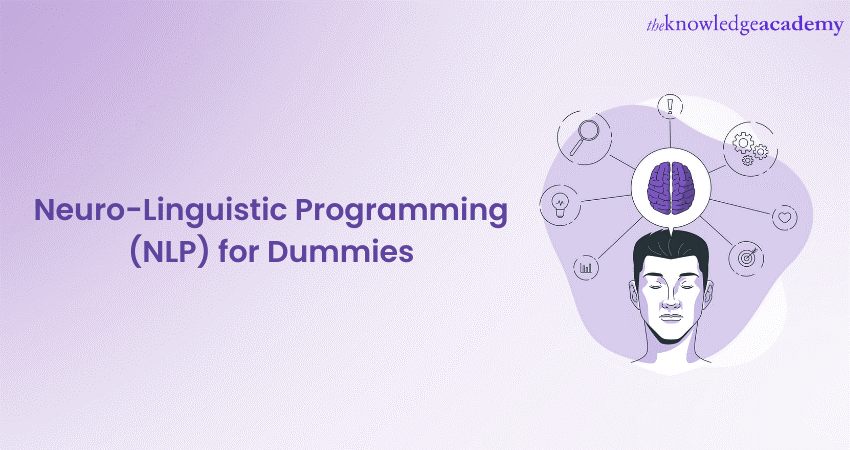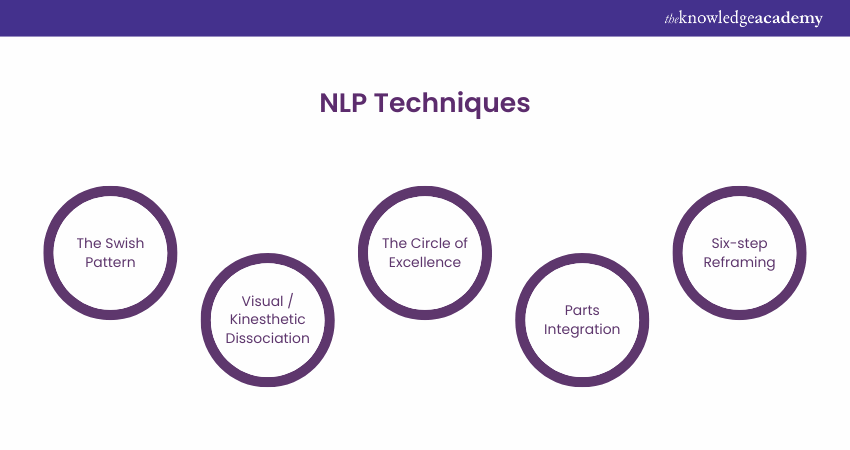We may not have the course you’re looking for. If you enquire or give us a call on +46 850282424 and speak to our training experts, we may still be able to help with your training requirements.
Training Outcomes Within Your Budget!
We ensure quality, budget-alignment, and timely delivery by our expert instructors.

Neuro-Linguistic Programming, or NLP, is a versatile and powerful approach to understanding human behaviour, communication, and personal development. NLP explores the connections between our neurological processes, language, and behavioural patterns, providing valuable insights into how we perceive the world and how we can improve our experiences. In this blog, we will go into greater detail on NLP for Dummies and explore the foundational principles of NLP and relevant NLP techniques.
Table of Contents
1) What is Neuro-linguistic Programming for Dummies about?
2) The foundational principles of NLP for Dummies
a) The communication model
b) The representational systems
c) Submodalities: The building blocks of experience
d) Anchoring: Creating powerful associations
e) Reframing: Changing perspectives
3) Understanding NLP Techniques in detail
4) Conclusion
What is Neuro-linguistic Programming for Dummies about?
Neuro-linguistic Programming for Dummies is an introduction to the core principles behind this practice which has helped people to become better versions of themself. These principles can seem complicated for beginners, however simplified and coherent explanations can help them benefit from NLP as well.
You can benefit from NLP as well, even if you may not find particular interest in the subject. If you have ever felt like you are unable to speak your mind, thus feeling repressed, NLP may be of use to you. It can help you gain an understanding of human traits that can holds you back from understanding others and the helpful methods that can lead to clear and Effective Communication.
The foundational principles of NLP for Dummies
Before we begin with the dummies’ guide to NLP, we will first define the foundational principles of NLP. The following are the foundational principles of NLP for Dummies:
The communication model
At the core of NLP lies the communication model, which emphasises the significance of how we process information and interact with the world around us. Understanding this model is crucial in comprehending the functioning of NLP techniques and the Types of Communications Skills involved.
The representational systems
NLP identifies different representational systems through which individuals perceive and process information. These systems include visual, auditory, kinesthetic, olfactory, and gustatory modalities. Recognising these systems can enhance communication and understanding between individuals.
Submodalities: The building blocks of experience
Submodalities are the finer details within each representational system that shape our experiences. By identifying and manipulating submodalities, NLP practitioners can bring about positive changes in perception and emotional responses.
Anchoring: Creating powerful associations
Anchoring is a technique used in NLP to create connections between a specific stimulus and a particular emotional state. Anchoring positive emotions enables individuals to access them whenever needed, promoting personal growth and confidence.
Reframing: Changing perspectives
Reframing is an NLP technique that involves shifting the way we perceive a situation or experience. By altering the frame of reference, we can reinterpret events and find more empowering meanings.
Take control of your mind and transform your life with NLP by joining our NLP Foundation Course today!
Understanding NLP Techniques in detail
Neuro-Linguistic Programming (NLP) offers empowering techniques for personal growth. Let's explore each of these five essential NLP Techniques in detail:

The Swish Pattern
This powerful NLP technique helps individuals replace negative habits or thought patterns with positive ones. To apply the Swish Pattern, first, identify the unwanted behaviour you wish to change. Then, create a vivid mental image of the desired behaviour and imagine it replacing the old pattern.
As you repeatedly practice this visualisation, the new behaviour becomes more natural and automatic, leading to positive changes in your life. Whether it's overcoming procrastination or boosting self-confidence, the Swish Pattern is a valuable tool for breaking free from unproductive habits.
Visual/Kinaesthetic Dissociation
This technique is especially useful for dealing with past negative experiences, traumas, or phobias. By mentally distancing yourself from these memories, you can reduce their emotional intensity and gain a fresh perspective.
To use Visual/Kinaesthetic Dissociation, close your eyes and recall the distressing memory in detail. Then, imagine stepping outside of yourself as if watching the memory on a movie screen. Observe the experience from a detached perspective, and if it feels overwhelming, try playing it backwards or adding humorous elements. This technique can lead to emotional healing and help you move forward with renewed strength. This is one of several NLP Dissociation Techniques that can be used to manage and transform emotional experiences.
Want to transform your life with NLP? Sign up for our NLP Foundation and Practitioner Training Course today!
The Circle of Excellence
This NLP technique allows you to access your most resourceful states at will, making it ideal for boosting confidence and performance before significant events. To create your Circle of Excellence, first, recall several moments when you felt at your best - confident, powerful, or joyful. As you visualise these experiences, draw an imaginary circle on the ground and step into it. In this circle, amplify the positive emotions associated with those resourceful moments.
While experiencing the peak of these emotions, perform a physical gesture like squeezing your thumb and forefinger together. By repeating this process with different resourceful memories and associating them with the same gesture, you can anchor these empowering states and access them whenever needed, such as before an important presentation or challenging task.
This technique is closely related to developing assertiveness. For more on this, you might explore How to be more Assertive and the Advantages of Assertiveness.
Parts Integration
This technique is designed to resolve inner conflicts caused by conflicting beliefs or desires within yourself. It involves communicating with the different parts of yourself and finding common ground to harmonise them. To apply Parts Integration, identify the conflicting aspects of yourself, like one part that wants to take risks and another that fears uncertainty. Understanding the Benefits of NLP Training can help you effectively utilise this technique and other NLP methods to enhance personal growth and resolve internal conflicts.
Engage in an internal dialogue with these parts, understanding their intentions and positive motivations. Then, encourage them to find a shared objective that benefits both. As you imagine these parts merging into a unified, stronger version of yourself, you can achieve a sense of inner alignment and emotional balance, helping you make decisions that align with your core values and aspirations.
Six-Step Reframing
This NLP technique is a structured process for addressing internal conflicts or unresolved emotions. By detecting the root cause of an issue and reframing it positively, individuals can overcome limiting beliefs and emotional challenges. To use Six-Step Reframing, clearly define the problem you want to address. Understanding NLP Learning Styles can further enhance your ability to apply this technique effectively by tailoring your approach to how you best process and integrate information.
Establish communication with the part of yourself that holds the issue, understanding its positive intentions. Then, find alternative behaviours or beliefs that can fulfil those intentions in a more constructive way. Ensure that the part agrees with these alternatives and intends to adopt them. Finally, integrate the new alternatives into your thought patterns or behaviours, testing the change over time for effectiveness.
Conclusion
In conclusion, Neuro-Linguistic Programming (NLP) is a valuable tool for personal growth, effective communication, and improving various aspects of life. By understanding the foundational principles and techniques of NLP, individuals can empower themselves to make positive changes and lead more fulfilling lives. Hope this blog told you all you needed to know about NLP for Dummies!
Unlock your potential and master the art of NLP by joining our comprehensive NLP Training Courses now!
Frequently Asked Questions

NLP for Dummies can quickly enhance your communication skills by offering easy-to-understand insights into how language and thinking influence behaviour. It provides practical techniques for better rapport building, effective listening, clear message delivery, and understanding non-verbal cues.

Learning NLP can significantly benefit your career by improving your communication, leadership, and interpersonal skills. It equips you with techniques for better understanding and influencing others, resolving conflicts, setting and achieving goals, and enhancing decision-making abilities.

The Knowledge Academy takes global learning to new heights, offering over 30,000 online courses across 490+ locations in 220 countries. This expansive reach ensures accessibility and convenience for learners worldwide.
Alongside our diverse Online Course Catalogue, encompassing 17 major categories, we go the extra mile by providing a plethora of free educational Online Resources like News updates, Blogs, videos, webinars, and interview questions. Tailoring learning experiences further, professionals can maximise value with customisable Course Bundles of TKA.

The Knowledge Academy’s Knowledge Pass, a prepaid voucher, adds another layer of flexibility, allowing course bookings over a 12-month period. Join us on a journey where education knows no bounds.

The Knowledge Academy offers various NLP Training, including NLP Foundation and Practitioner Courses. These courses cater to different skill levels, providing comprehensive insights into “What is NLP?”
Our Business skills Blogs cover a range of topics related to NLP, offering valuable resources, best practices, and industry insights. Whether you are a beginner or looking to advance your Business skills, The Knowledge Academy's diverse courses and informative blogs have you covered.
Upcoming Business Skills Resources Batches & Dates
Date
 Neuro Linguistic Programming
Neuro Linguistic Programming
Fri 17th Jan 2025
Fri 21st Mar 2025
Fri 16th May 2025
Fri 18th Jul 2025
Fri 19th Sep 2025
Fri 21st Nov 2025







 Top Rated Course
Top Rated Course



 If you wish to make any changes to your course, please
If you wish to make any changes to your course, please


